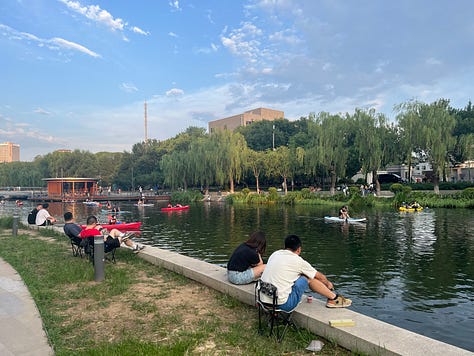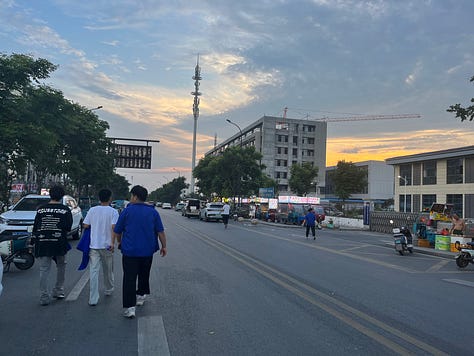Welcome to the 2nd edition of Suipian, my new personal newsletter in which I share thoughts and resources that help me make sense of Chinese society and its relationship to the rest of the world. You’re receiving this because you were previously subscribed to Changpian, my earlier newsletter sharing Chinese nonfiction writing – or if you recently subscribed of course! See here for more introduction to Suipian.
I hope you have been having a good summer. I have been moving between riversides in China (Liangmahe) and Rotterdam (Nieuwe Maas) – and feel lucky to be able to do that. Heading back to Beijing this weekend.
This is a pretty long one. It looks like this newsletter will come out once every 1-2 months (aiming for shorter monthly ones), and you might find I get to things a bit slow – certainly not at news cycle pace. But I hope you enjoy this edition and find something in it to add to your late summer reading.
随笔 // Suibi // Notes
Sharing thoughts or resources related to my work as a correspondent
1. Generations. I recently wrote a brief review of Peter Hessler's new book Other Rivers: A Chinese Education for our paper. Although the Dutch translation was not great (and somehow came out before the original), I thoroughly enjoyed the tour de force of this book on how members of two generations (or even three, per Yangyang Cheng’s much better review) experience China’s development. As a long-time fan, I was struck this time by Hessler's ability to articulate concrete cultural characteristics of Chinese society today without essentializing them. I am someone who is wired towards identifying commonalities rather than differences, but for weeks after reading Other Rivers, I'd walk around Beijing with new language and awareness of what I encountered (in the public safety culture, say, or in terms of people’s high – but shifting – tolerance for environmental noise).
One evening, as I was out reporting for a story on electric vehicles in Hefei, I also remembered Hessler's writing on how his Sichuan University students brought the grit and capacity for boredom ("one of the lesser-known secrets of effective journalism") that they cultivated preparing for the gaokao to his reporting assignments. It inspired me to stick around outside a BYD factory for longer than I otherwise might have – long enough for my reporting luck to improve and have a lovely dinner conversation with a few engineers after their shift.
As I mention in the review, this book is more about politics than Hessler’s previous books. His follow-up piece in ChinaFile revisits some of the most politically charged moments of his 2019-2021 experience in China. As for the term 'sideline sinology' it introduces to refer to a generation of experts who do not spend time in the country – I don’t think ‘presence in China’ should be emphasized as a dividing line within China research communities. There are so many great China scholars who for a variety of reasons don’t spend much time in the country. And while on-the-ground presence is irreplacable, the digital and transnational topics many now research from abroad are hardly ‘sideline’ phenomena. But I certainly sympathize with Hessler’s critique of unfair criticism lobbed from the sidelines. I have also noticed that, while in Europe China is not (yet) a very politicized topic among the wider population, the atmosphere among China professionals can get more tense and polarized than 5 or 10 years ago. Perhaps this is inevitable given our disparate experiences and beliefs but it's also unfortunate, as basically all of us share an aim of better understanding Chinese society.



2. Hu Youping. It’s been a while but, like many, I was moved after the passing of Hu Youping, the 54-year-old Suzhou school bus attendant who restrained a man with a knife from attacking a Japanese boy and his mother before being attacked by him herself. Initial media reports, including mine, focused on the online vitriol, inevitable given the dominance of extreme nationalists on China’s internet, and the state actors who tried to downplay the Japan connection.
But the real story was arguably the wider societal response or 全民纪念, as media scholar 闾丘露薇 later called it, that mourned Hu and was critical of the nationalists (even leading to pressure on the internet platforms that usually fan anti-Japanese hate to curb it). It was nice to see these moderate views that public opinion studies often find (as I did in my study of Chinese immigration attitudes) receive attention, as they tend not to.
In the days after the news broke, essays appeared critically reflecting on online nationalism and asking for more information about Hu (“知道了她的名字,还远远不够”). Several articles by Phoenix News and 南方周末 filled in details on Hu’s career as a factory worker, cleaner and entrepreneur and her lively personality. If you were also wondering about the person behind the touchingly plain passport picture in the official announcement (“你看她那张脸,再普通不过了”), you might have a look, also to reflect on what ‘ordinary’ – visually, ethically or otherwise – even means. (Calls for more information on the attacker, according to some also a victim of a “天天都在上演的大戏” were censored.)
3. Dissident stories. Disturbing stories about Wang Jingyu have been going around for years, following his arrival in continental Europe as a self-professed - and soon much-cited – dissident while those in Chinese dissident circles did not know him. NPR's Frank Langfitt did the community a service by thoroughly reporting on one of those stories, finding that the serious harassment of a Chinese dissident's family that was previously reported as being perpetrated by Chinese state actors can be linked to Wang.
There is more to look at on Wang (see for instance this article from France in which he is an important source, and several other stories linked to him involving bomb threats), and on his motivation. The reporting on his claims in the international press on topics like overseas Chinese police stations (with so far a retraction by AP) illustrates the complexity of Chinese diaspora stories. There are so many stories of dissidents and overseas minorities that need telling (like, recently, this good WSJ profile of a young and active Europe-based dissident), while fact-checking what the CCP is and is not doing abroad is difficult but important. At the same time, any reporter taking up these stories needs full institutional support as they are not without personal risk.
点赞 // Dianzan // Likes
Recommendations in and out of the news-cycle
Sanlian journalist Chen Lu joins Paul Salopek on the last 70 kilometers of his years-long walking journey in China, where he walked along the 胡焕庸线 and had lots of interesting interactions. 人物 also did a feature on him, both well-read. (Also see Salopek’s own writing on his walk through China at National Geographic.)
A 24-minute documentary by director Rongfei Guo on two Chinese women’s travel to the US to freeze their eggs there, a fertility procedure not accessible to unmarried women in China (with a woman who had tried to sue a hospital into allowing her to freeze her eggs there recently losing her appeal). Also, this 不合时宜 podcast on the same topic.
端传媒新闻播客 has a 4-part podcast series out on 走线 in which reporter Zhaoyin Feng and others present a lot of migrant voices, including of people who took the Balkan route into Europe.
In-depth interview with scholar of Chinese dance Emily Wilcox in 澎湃’s 上海书评 that includes a lot of great images (and an abridged version in English).
Chinese non-fiction writer Yuan Ling does not like to generalize and wants to write about “人,你关心的是人,不是他身上的社会属性”. See this 单读 interview with Yuan on his new book about members of the Picun literature group, with sharp questions on gender and consent, and this piece about Yuan’s search for a side job that triggered debate on writing conditions in China since a recent downturn in book sales. Also, this list of 15 recent non-fiction titles that came out in China.
A short history of the binary phrase “China and the West”, which first became prominent in 1915-1929 and continues to suggest that when talking about China “[e]ssentially different perspectives seem to be at play”.
Writer Ian Johnson’s New Yorker profile of essayist Gao Ertai and its authorized Chinese translation in the 波士頓書評 newsletter. It made me want to look at Gao’s memoir. From the preface: “瞪着惊讶的眼睛(显出智力的限度),看世事如魔幻小说。看自己的过去,也觉得像是梦游.”
“Wardian case, glass, and fountain: A reflection on the history of shopping mall in Hong Kong” by Bo Wang and Lu Pan.
“她们取下戴了20多年的节育环” -- An artwork by artist Zhou Wending made of IUDs triggers conversation on the anticonception practices older generations of Chinese women have had to deal with.
Miriam Driessen and Ruiyi Zhu introduce China’s journey from “standards-taker to standards-maker” in a very readable academic introduction of a China Information special issue on standardization. I love these short but deep reform era histories on a specific issue.
You’ve probably seen it by now but, wow, what a good new issue of the Made in China Journal.
Intersections, a cool Substack on “coverage of women’s issues and feminism in the Chinese-language media space”.
That’s it for now. Thanks for reading :)




Thanks for the reflections, Tabitha. On your paragraph on Hessler’s new book: I remember thinking when reading the book that having a “capacity for boredom” is not the same as having discipline. The former, after all, is also what leads people to take tedious and menial 体制内 jobs. It is also what makes people feel they have little personal stake in what they do. Neither helps if a country’s goal is to become more innovative and dynamic. Both are reasons why it is often depressing to observe young people coasting through life with so much unfulfilled potential.